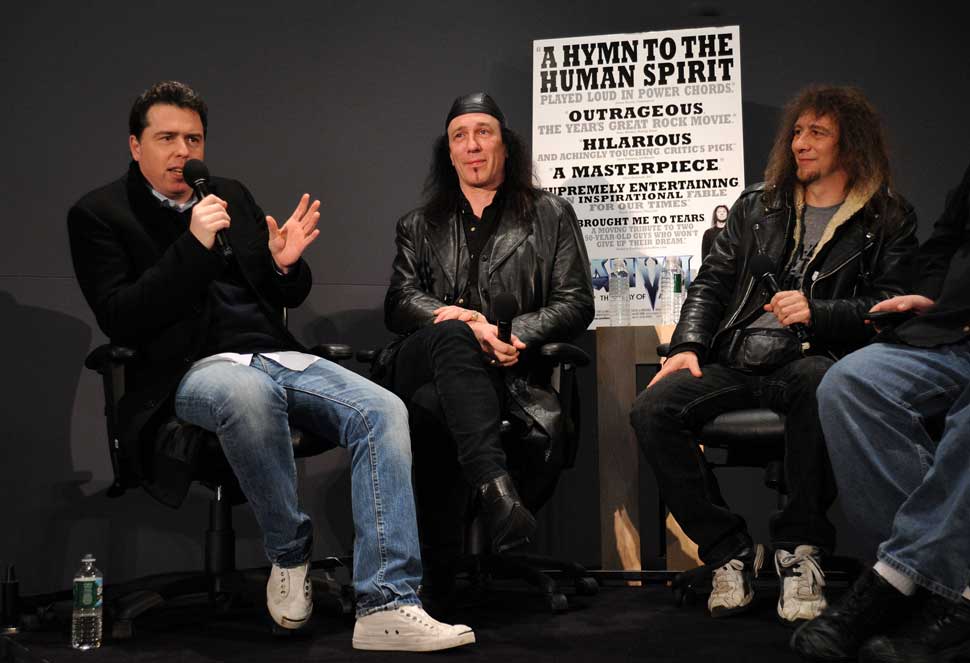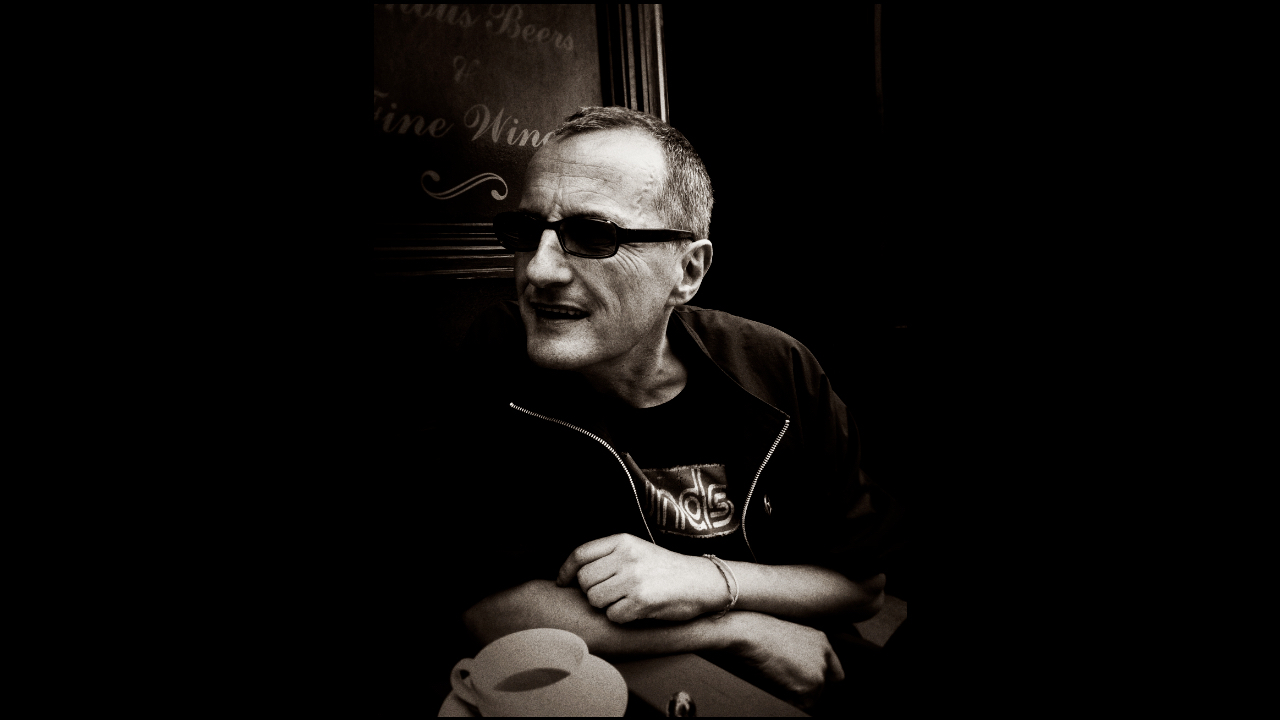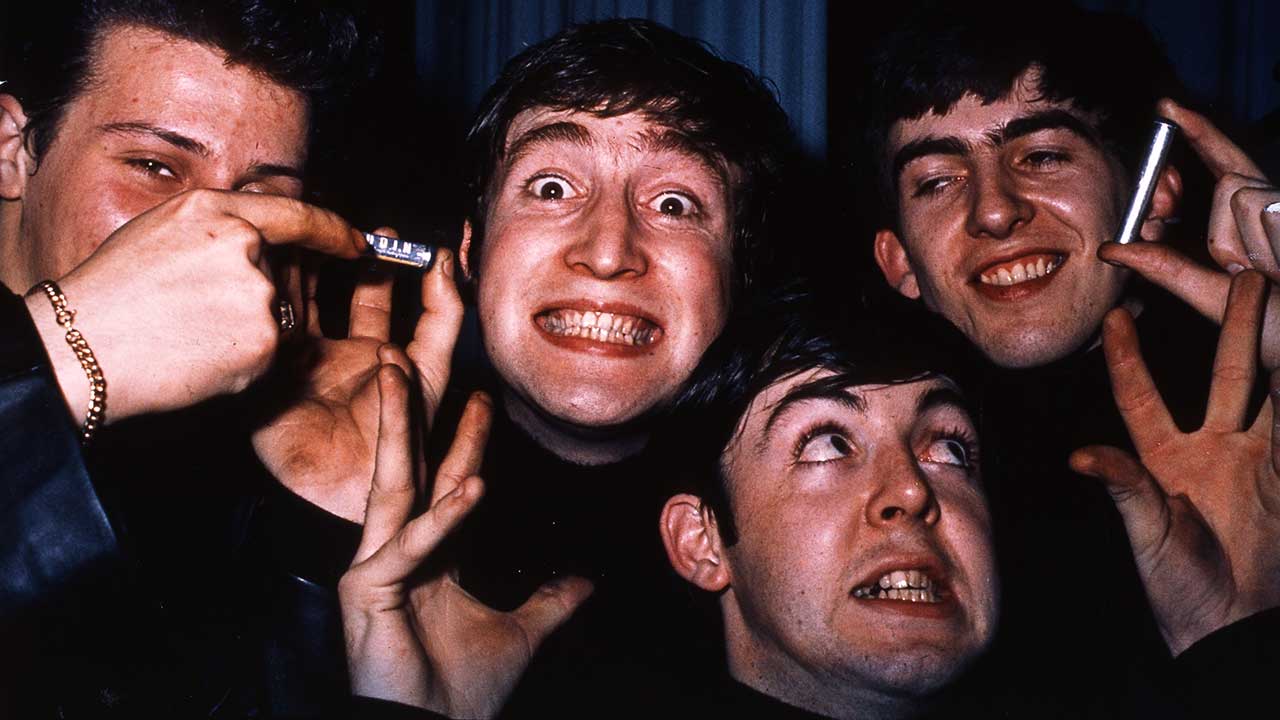How a film gave a second chance to Canada’s undefeatable metalheads Anvil
In 1982 a feature by a Classic Rock writer and photographer changed the life of a London schoolboy, leading ultimately to the creation of Anvil: The Story Of Anvil, one of the great rock movies

Select the newsletters you’d like to receive. Then, add your email to sign up.
You are now subscribed
Your newsletter sign-up was successful
Want to add more newsletters?

Every Friday
Louder
Louder’s weekly newsletter is jam-packed with the team’s personal highlights from the last seven days, including features, breaking news, reviews and tons of juicy exclusives from the world of alternative music.

Every Friday
Classic Rock
The Classic Rock newsletter is an essential read for the discerning rock fan. Every week we bring you the news, reviews and the very best features and interviews from our extensive archive. Written by rock fans for rock fans.

Every Friday
Metal Hammer
For the last four decades Metal Hammer has been the world’s greatest metal magazine. Created by metalheads for metalheads, ‘Hammer takes you behind the scenes, closer to the action, and nearer to the bands that you love the most.

Every Friday
Prog
The Prog newsletter brings you the very best of Prog Magazine and our website, every Friday. We'll deliver you the very latest news from the Prog universe, informative features and archive material from Prog’s impressive vault.
Back in 1982, photographer Ross Halfin and myself travelled across the Atlantic to interview a Canadian metal band called Anvil. The story ran on the cover of Sounds in April that year and made quite an impact, if only on one Westminster schoolboy.
Back then, Sacha Gervasi “was going to the Marquee, Bandwagon and all those places” watching “everyone from Randy California to Iron Maiden. At that time I was the only heavy metal fan at my school and I’d get teased mercilessly about it.”
Gervasi would later make music with Bush, make movies with Hanks, Kidman and Spielberg – and make babies with Ginger Spice – but back then seeing Anvil in Sounds had an impact that would change his life forever: “That cover story blew me away,” says Sacha today. “Here was this tousle-haired Canadian called Lips dressed in figure-hugging black leather, brandishing a chainsaw and clenching a dildo between his teeth. Then I went down to see them at the Marquee. Those shows were fucking unbelievable. They were so hilarious, powerful, fast and intense.”
Gervasi became a roadie for the band for a short time, before going his own way, via drugs, law school and Gavin Rossdale, to Hollywood. Years later, as a successful film-maker, he decided to track down the band and make a documentary about them. He even called up Ross Halfin and yours truly and asked us to be interviewed for the film. The only problem? I couldn’t remember anything about Anvil.
I wasn’t alone: the whole world had forgotten about Anvil. Everyone, that is, except a former Sounds-reading public schoolboy, reformed junkie, member of Bush – and the band themselves who were, it turns out, hard at it, still determined to hit the big time.

Gervasi’s film, Anvil! The Story of Anvil documents the relative rise and spectacular fall of the Canadian cult heroes who at one time were acknowledged as the precursors to the thrash metal movement. It is a tragicomedy/homage/all-too-familiar tale of what happens to the 99 per cent of the musicians who don’t make it in this business – but maybe this time it comes with a happy ending.
In the early 80s, Anvil (Steven ‘Lips’ Kudlow, guitar/vocals, Robb Reiner, drums, Ian Dickson, bass, and Dave ‘Squirlly’ Allison on guitar/vocals) had everything going for them: a major record deal, top producer, heavyweight management, positive press, and a successful string of shows at the legendary Marquee club (witnessed by rock royalty like Motorhead and Def Leppard). They had the keys to the proverbial kingdom and then they disappeared. Or so it seemed. 26 years later, Lips and Robb are still plying their trade – still believing that their big break is just around the corner.
Sign up below to get the latest from Classic Rock, plus exclusive special offers, direct to your inbox!
The documentary kicks off with the band at the height of their powers, performing at a sold-out Japanese festival, and then quickly cuts to the present day and the less salubrious surroundings of a Toronto bar populated by their faithful few older fans (or ‘dogs’, as they describe themselves) in various states of disrepair, some of whom appear to be drinking beer through their studded noses. There is no stage, lights or even a roadcrew, but the band are still playing as if their lives depend on it.
“Sometimes I close my eyes and imagine I am playing to a full house,” Lips admits during one of the many melancholy moments in the film. Full of unrehearsed hilarity – a highlight being the final date of a disastrous European tour which culminates at the Monsters Of Transylvania rock festival, where only 200 Romanian headbangers show up and the support act is a raffle – there are also moments of victory (like when the band are reunited with producer Chris Tsangerides to record their new album, This Is Thirteen). The closing scenes are guaranteed to get even the hardest of rockers reaching for the Kleenex.
The movie has already won awards all over the world with fans including Pearl Jam, Ozzy Osbourne, Weezer and Keanu Reeves, and glowing reviews from heavyweights like Michael Moore (“The best documentary I’ve seen in years!”) and the Wall Street Journal (“No other film that I saw at Sundance bought me to tears as much as Anvil!”).
A tale of triumph over tragedy, it is skilfully crafted and avoids falling into tired clichés and cynicism by virtue of the fact that Sacha Gervasi, the man who put it together, was and still is a genuine fan.
After reading our Anvil feature in Sounds, the schoolboy Gervasi caught the band at the Marquee and blagged his way backstage only to be welcomed by the disaffected, amiable Canukes who seemed more interested in the genuine fans than the NWOBHM royalty who had come to pay their respects.
“They told me that they’d never been to London before,” said Sacha, whose motormouth delivery and genuine enthusiasm seems to have powered most of the publicity for the movie, “so I offered to be their tour guide and they adopted me as their mascot. I showed them all the sights – Westminster Abbey, Carnaby Street, Abbey Road – and they christened me Teabag.”
Impressed by their new British friend the band offered young Teabag a summer slot as roadie on their American tour. Although still very much a minor, Gervasi used the fact that his parents were divorced and living on either side of the continent to his advantage and soon found himself on the road doing backline, merchandise and – much to his delight – setting up Robb Reiner’s drums.
“I watched Robb play every night and I was thinking, ‘This is unbelievable: here I am watching the best drummer in the world.’ At that time he had turned down a gig with Ozzy because he wouldn’t turn his back on Anvil. I learnt so much over those two months and by the end of the tour Robb would even let me join the band onstage. It was like I’d died and gone to heaven.”
Sacha was also witness to the less salubrious aspects of road life. This was, after all, the band whose repertoire included March Of The Crabs, Tag Team and Butter Bust Jerky (they are currently working on an instrumental opus called Vulcan Vulva).
“I’ll never forget the time [original guitarist] Squirlly was making love to this girl and they were really drunk,” says Gervasi. “And the whole band was sitting around watching. In the middle of all this, the girl vomits a single jet – it looked like an oil strike and rained down on both of them – and they kept on having sex. So they christened her ‘Geyser Chops’.”
Over the next few years Sacha and the band drifted apart. While Anvil unsuccessfully pushed in the direction of glam metallers like Ratt and Bon Jovi, Gervasi pursued a diverse selection of careers, including a brief stint with a prototype Bush (which ended spectacularly when he passed out behind the kit in a narcotic stupor at a showcase gig), law school and curator for the works of poet Ted Hughes. Meanwhile, says Sacha, “all these bands that used to idolise Anvil in the early days – Anthrax, Megadeth and Slayer – were starting to make it and Anvil never did.”
Gervasi’s peripatetic career-hopping finally took him to the States where he sobered up and embarked on a career in the movies, but he always remained curious as to what happened to his Canadian cohorts and in 2005 he decided to investigate.
Sacha: “I had just finished working on this film called The Terminal with Tom Hanks and Spielberg and for whatever reason it came into my mind that I had to find Anvil. So I got on the internet and wrote on their website and within an hour got a message from Lips saying, ‘Teabag! We thought you’d died or became a lawyer!’ The fact was that I had almost died from an overdose and had gone to law school, so he was right on both counts!”
Friends reunited, Sacha flew Lips out to Los Angeles and felt an immediate connection with his ‘heavy metal schoolboy crush’.
“It was like no time had passed at all, I felt like I was 15 again,” says a misty eyed Gervasi. “It was like stepping back into your childhood and everything’s the same again. More importantly, they hadn’t changed. What was remarkable for me wasn’t that they hadn’t given up, but the complete lack of bitterness. Lips really didn’t care. He said, ‘I love playing – so why would I stop?’ They just kept making albums, playing – they were doing it for real. And I thought, ‘This is what rock’n’roll is’. I wasn’t even thinking about a film.”
It was after a meeting with his friend/mentor scriptwriter Steve Zallian (American Gangster/Schindler’s List) that Gervasi decided to embark on his directorial debut. “While Steve and I were talking, Lips was out in the garden playing air guitar and explaining thrash metal time signatures to Steve’s wife. I looked at Steve and said, ‘You know these guys never gave up and still believe they can make it!’ And on one hand I thought, ‘My God, that’s so fucking tragic – how could they possibly believe they can make it?’ But on the other hand it was so fucking inspiring. Any normal person would have given up his dream, but they just refused to quit.”
When Classic Rock meets Lips and Robb for the first time in 26 years it’s instantly noticeable how little they’ve changed. Looking a little dazed and bemused (Sacha: “It’s hardly surprising – they’ve just smoked a fucking pound of grass!”) it was remarkable to see how unaffected they were by the attention they were receiving from the mainstream press.
I had brushed up on my first encounter with Anvil and now I could remember this: that I met them not long after the release of their Hard’N’Heavy album in 1982, which led to a trip to Toronto where I saw the band play six stunning sold-out shows at a notorious biker bar called The Gasworks. I remember the record company offering us the choice of expenses for meals or a nice parcel of Bolivian Marching Powder (we took the latter, much to the band’s delight).
I remember Lips in full bondage gear getting offstage and proceeding to mix a young lady’s drink with his giant five-gear vibrator, as her stunned and bewildered boyfriend looked on, not knowing whether to laugh or clobber the guitarist (he laughed).
And I remember the band’s humour and enthusiasm for metal in a country then devoid of both. I have no doubt that if they were born on the other side of the lake in Detroit that Anvil would have got much more recognition.
“Sure,” agrees Lips, “but we stayed in Canada. What the fuck could we do? We didn’t have any money – we couldn’t run away like we wanted to.”
At the time I described Anvil as ‘Canada’s number one secret weapon’ and was convinced that with the right guidance they could make a name for themselves internationally. They were far more entertaining and self-effacing than the new generation of HM artists who were becoming as po-faced and grandiose as their predecessors. But as time passed, memories of the meeting faded and the band seemed to dissolve into the ether.
If I felt bad that my recollections of the band were vague, I felt better when I read in an interview that even their former manager David Krebs could barely remember them. So what happened, boys?
“We got lucky for a while but what went wrong is that we were involved with a bunch of influential people who didn’t follow up any of their promises,” says Lips.

Lips is now convinced that their whole life experience was predetermined: it was all just a build up to this movie: “What’s weird is that we had just got back from a festival where we met Candlemass and they told us they had seen us play at the Marquee and then bumped into us in Carnaby Street. So then I started thinking, ‘I wonder what happened to Sacha?’ And then he sent me an email! So it was if I had a premonition.
“At this point I’m not surprised at anything,” he adds, sounding like a very stoned Mystic Meg. “I really feel that this was meant to be. We each had to make our journey and I think my obscurity was what I had to achieve in order for this whole thing to come to pass.”
Reiner is equally stoned but a little less Zen in his overview of the band’s career: “In the early days it really bothered me a lot that we didn’t make it. In fact it still bothers me when I see bands with careers – it pisses me off, and I think, ‘We should be fucking doing that shit’.”
At least Anvil can console themselves with the fact that artists like Lars Ulrich, Lemmy and Slash were more than happy to contribute to the movie and acknowledge Lips & Co’s influence. Hopefully most of the people who come and see the film will look further than the obvious Spinal Tap-isms and Anvil will actually garner a career out of it.
“We wanted to make a film that reached beyond a metal audience,” concludes Gervasi. “Whatever you think of them or heavy metal is fucking irrelevant. The fact is that these guys are doing it for real and you could learn from them.”
Unsurprisingly, Robb’s critique of the film is less complex and more humble: “I’m just amazed that it’s been so successful,” he says. “I mean, why would anyone fucking care about us?”

Director Sacha Gervasi’s four favourite moments that didn’t make the final cut
1. Original Anvil bassist, Ian ‘Dicks’ Dickson, now one of North America’s leading model makers, working on a life size dinosaur he built for the foyer of the Baltimore Museum of Science.
2. Lips crumpling to his knees behind a Marshall stack attempting to push his haemorrhoids back in during Robb Reiner’s White Rhino drum solo at the Monsters Of Transylvania rock festival.
3. Top hypnotist Paul McKenna having a session with Anvil using ground-breaking techniques to help them feel like “successes inside first”.
4. Former Anvil rhythm guitarist, Dave ‘Squirlly’ Allison fishing with his dog on a lake in Minden, Ontario – where he is now a lumberjack – as he explained why he left the band: “I was tired of eating macaroni and cheese and sleeping on my brother-in-law’s window sill.”
This feature originally appeared in Classic Rock 126, in October 2006. Anvil: The Story Of Anvil is on streaming platforms now. Anvil's next album is due in 2022.
Pete Makowski joined Sounds music weekly aged 15 as a messenger boy, and was soon reviewing albums and doing interviews with his favourite bands. He also wrote for Kerrang!, Soundcheck, Metal Hammer and This Is Rock, and was a press officer for Black Sabbath, Hawkwind, Motörhead, the New York Dolls and more. Sounds Editor Geoff Barton introduced Makowski to photographer Ross Halfin with the words, “You’ll be bad for each other,” creating a partnership that spanned three decades. Halfin and Makowski worked on dozens of articles for Classic Rock in the 00-10s, bringing back stories that crackled with humour and insight. Pete died in November 2021.

